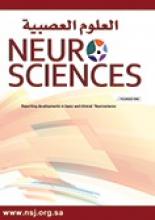Research ArticleOriginal Article
Open Access
The role of brain magnetic resonance imaging on the timing of antiepileptic drugs withdrawal following mesial temporal lobe epilepsy surgery
Miad Albalawi, Fawzi Babtain, Saleh Baeesa, Youssef Al- Said and Khalid Alqadi
Neurosciences Journal July 2021, 26 (3) 270-276; DOI: https://doi.org/10.17712/nsj.2021.3.20200182
Miad Albalawi
From the Department of Neurosciences (Albalawi, Babtain, Baeesa, Al- Said, Alqadi), King Faisal Specialist Hospital and Research Centre, and from the Division of Neurosurgery (Baeesa), Department of Surgery, King Abdulaziz University, Jeddah,Saudi Arabia
MDFawzi Babtain
From the Department of Neurosciences (Albalawi, Babtain, Baeesa, Al- Said, Alqadi), King Faisal Specialist Hospital and Research Centre, and from the Division of Neurosurgery (Baeesa), Department of Surgery, King Abdulaziz University, Jeddah,Saudi Arabia
MDSaleh Baeesa
From the Department of Neurosciences (Albalawi, Babtain, Baeesa, Al- Said, Alqadi), King Faisal Specialist Hospital and Research Centre, and from the Division of Neurosurgery (Baeesa), Department of Surgery, King Abdulaziz University, Jeddah,Saudi Arabia
MD, FRCSCYoussef Al- Said
From the Department of Neurosciences (Albalawi, Babtain, Baeesa, Al- Said, Alqadi), King Faisal Specialist Hospital and Research Centre, and from the Division of Neurosurgery (Baeesa), Department of Surgery, King Abdulaziz University, Jeddah,Saudi Arabia
MD, FRCPCKhalid Alqadi
From the Department of Neurosciences (Albalawi, Babtain, Baeesa, Al- Said, Alqadi), King Faisal Specialist Hospital and Research Centre, and from the Division of Neurosurgery (Baeesa), Department of Surgery, King Abdulaziz University, Jeddah,Saudi Arabia
MD
References
- 1.↵
- Wiebe S ,
- Blume WT ,
- Girvin JP ,
- Eliasziw M.
- 2.↵
- McIntosh A ,
- Wilson SJ ,
- Berkovic SF.
- 3.↵
- Téllez-Zenteno JF ,
- Dhar R ,
- Wiebe S.
- 4.↵
- 5.↵
- Cramer JA ,
- Mintzer S ,
- Wheless J ,
- Mattson RH.
- 6.↵
- 7.↵
- Ivanova JI ,
- Birnbaum HG ,
- Kidolezi Y ,
- Qiu Y ,
- Mallett D ,
- Caleo S.
- 8.↵
- 9.↵
- 10.↵
- Schmidt D ,
- Baumgartner C ,
- Löscher W.
- 11.↵
- 12.↵
- Rathore C ,
- Jeyaraj MK ,
- Dash GK ,
- Wattamwar P ,
- Baheti N ,
- Sarma SP , et al.
- 13.↵
- 14.↵
- Ladino LD ,
- Hernández-Ronquillo L ,
- Téllez-Zenteno JF.
- 15.↵
- Cole AJ ,
- Wiebe S.
- 16.↵
- 17.↵
- Yardi R ,
- Irwin A ,
- Kayyali H ,
- Gupta A ,
- Nair D ,
- Gonzalez Martinez J , et al.
- 18.↵
- Kim YD ,
- Heo K ,
- Park SC ,
- Huh K ,
- Chang JW ,
- Choi JU , et al.
- 19.↵
- 20.↵
- Lowe AJ ,
- David E ,
- Kilpatrick CJ ,
- Matkovic Z ,
- Cook MJ ,
- Kaye A , et al.
- 21.↵
- McIntosh AM ,
- Kalnins RM ,
- Mitchell LA ,
- Fabinyi GC ,
- Briellmann RS ,
- Berkovic SF.
- 22.↵
- Wieser HG ,
- Häne A.
- 23.↵
- 24.↵
- 25.↵
- Jeong SW ,
- Lee SK ,
- Hong KS ,
- Kim KK ,
- Chung CK ,
- Kim H.
- 26.↵
- 27.↵
- 28.↵
In this issue
The role of brain magnetic resonance imaging on the timing of antiepileptic drugs withdrawal following mesial temporal lobe epilepsy surgery
Miad Albalawi, Fawzi Babtain, Saleh Baeesa, Youssef Al- Said, Khalid Alqadi
Neurosciences Journal Jul 2021, 26 (3) 270-276; DOI: 10.17712/nsj.2021.3.20200182
Jump to section
Related Articles
- No related articles found.
Cited By...
- No citing articles found.





